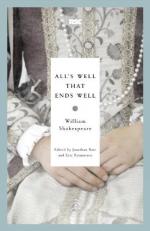|
This section contains 6,577 words (approx. 22 pages at 300 words per page) |

|
SOURCE: "Shakespeare's 'Rough Magic': Ending as Artifice in All's Well That Ends Well," in The Centennial Review, Vol. XXVII, No. 2, Spring, 1983, pp. 117-34.
In the following essay, Cartelli suggests that the "problematic" ending of All's Well That Ends Well was purposely created by Shakespeare to prompt the audience to recognize its role as theater-goer, and notice the art of play making.
I
The problem of closure in All's Well is not a new one. It has been with us since Dr. Johnson first characterized the play's ending as "improbably produced or imperfectly represented" and endures in such forms as Richard A. Levin's recent contention that "At the conclusion of All's Well, we look around the stage and see that a real reckoning has not taken place."1 And yet, as Ian Donaldson tells us, in no other play of Shakespeare's is the playwright more concerned with the problems of...
|
This section contains 6,577 words (approx. 22 pages at 300 words per page) |

|


